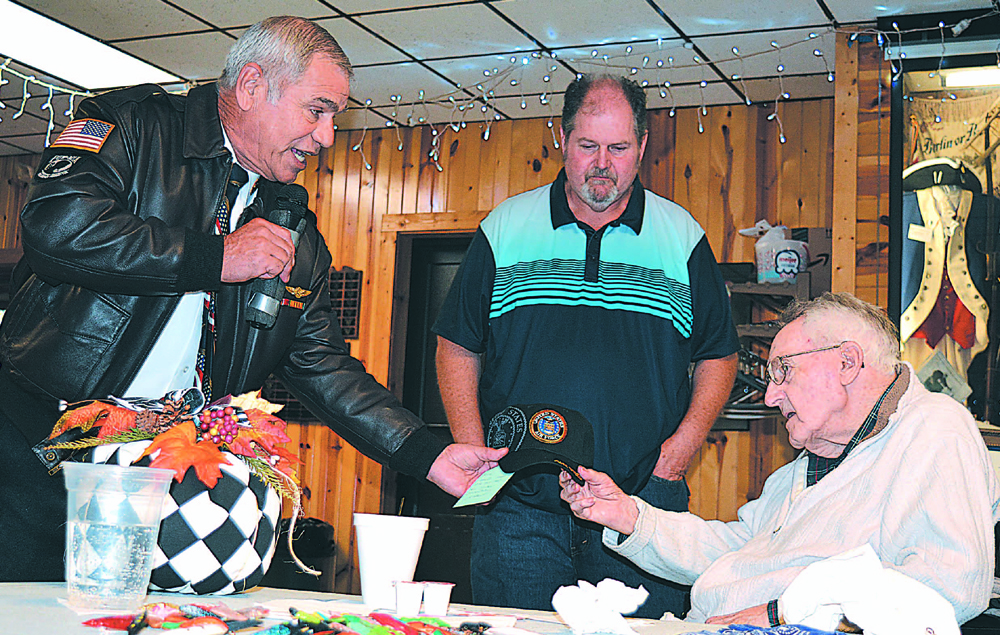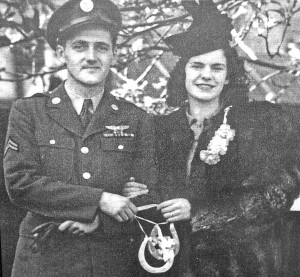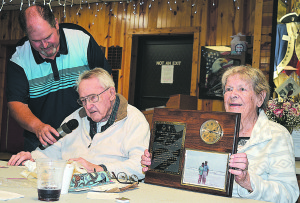
How appropriate that Harry and Muriel Ahlborn celebrated their 75th wedding anniversary Sunday afternoon at American Legion Post 108 in Oxford because it was his military service that brought them together during World War II.
To commemorate this milestone, the couple was presented a beautiful plaque while surrounded by family and friends.
“If you want to live this long, be true to yourself and be true to your wife,” said Harry, who turned 99 on Sept. 12.
“It’s wonderful to see all of you here, all at once,” Muriel said. “When I first came to this country as an 18-year-old girl, I didn’t know anybody and look what I’ve ended up with – the best family anybody could ever (ask) for.”
The Ahlborns were married on Oct. 2, 1943 at St. Andrew’s Church in Wimbledon, London, England.
Back then, Harry was serving with the vaunted Eighth Air Force, part of the U.S. Army Air Forces (AAF), as a flight engineer and gunner aboard a B-24 heavy bomber, while Muriel was an office worker for the Red Cross.
As part of the celebration, Post 108 Commander Rick Moorhead made an appearance to present Harry with a special hat and pin.
“I commend you for your service,” he said.
In the years following WWII, Moorhead said the U.S. military became equipped with “faster planes” piloted by “highly-trained” individuals, but their abilities and actions still “cannot compare” to the acts performed by Harry and his comrades during the Allies’ drive to end Nazi tyranny.

“They had a job to do and they did it,” Moorhead said. “Because of that, we’re all here today and we’re all speaking English.”
Between 1942 and 1945, the Eighth Air Force, nicknamed The Mighty Eighth, “precisely executed” a daylight strategic bombing campaign against Nazi-occupied Europe that “compiled an impressive war record,” according to the U.S. Air Force.
The Eighth Air Force flew more than 440,000 bomber sorties, during which it dropped 697,000 tons of bombs, and secured 11,200 aerial victories. Its men earned 17 Medals of Honor, 220 Distinguished Service Crosses and 442,000 Air Medals.
But the Eighth paid dearly for that success as it suffered 47,483 casualties, of which more than 26,000 were deaths, and lost more than 5,100 aircraft, according to the Air Force.
As a whole, the AAF suffered a total of 115,332 casualties during the war.
Ahlborn flew his last mission with the Eighth as part of the 93rd Bombardment Group’s April 16, 1943 assault on Brest, France.
During the mission, the B-24 Liberator that Ahlborn was serving aboard was badly damaged by enemy fire.
Some crew members bailed out, but Ahlborn and others remained as the pilots were able to get the plane under control.
Manning one of the gun turrets, Harry engaged in a fierce firefight with attacking German planes, the details of which were contained in the 1997 book “The Mighty Eighth: The Air War in Europe as Told by the Men Who Fought It,” written by Gerald Astor.
In the book, Red Komarek, the tail gunner on that B-24, recounted Harry’s deeds to Astor – “Harry . . . spotted a fighter coming in and gave him a short burst as he began to pull up and over. Harry fired again and saw his tracers enter the engine, making the (German plane) quiver. It blew up into a cloud of black smoke, flipped over and dove into the water.”
The B-24 was able to make it back to England and crash land at a Royal Air Force station. All of the crew members survived.

It was Ahlborn’s third and final crash of the war, according to his family, and following that mission, he was grounded.
Shortly after, he met Muriel and made her his bride.
When the couple returned to the United States, they settled in Orion and built a life together. Harry spent many years working as a brickmason before retiring to East Jordan, Michigan. The couple now lives in Waterford.
Oxford resident Larry Ahlborn, Harry’s nephew, worked with him for a while and described him as “a very fair gentleman.”
Orion resident Ted Ahlborn, Larry’s brother, noted Harry never hesitated to offer somebody a job if he saw they needed it. Lending a helping hand mattered more to him than qualifications or work history.
“He’d hire them on the spot,” Ted said. “That’s pretty admirable . . . He gave people a fair shake.”

Leave a Reply